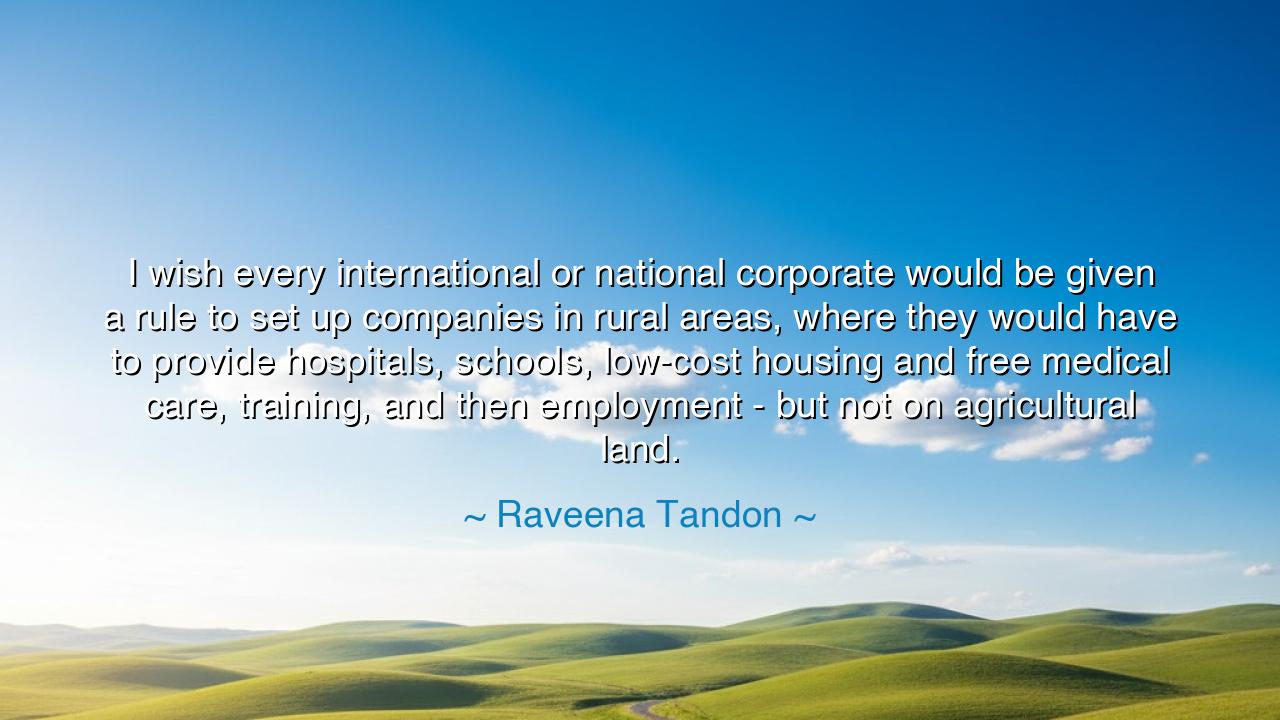
I wish every international or national corporate would be given a
I wish every international or national corporate would be given a rule to set up companies in rural areas, where they would have to provide hospitals, schools, low-cost housing and free medical care, training, and then employment - but not on agricultural land.






The words of Raveena Tandon rise like a call from the heart of the earth itself: “I wish every international or national corporate would be given a rule to set up companies in rural areas, where they would have to provide hospitals, schools, low-cost housing, and free medical care, training, and then employment—but not on agricultural land.” These are not the idle musings of a dreamer, but the lament and hope of one who sees the unequal landscape of humanity and yearns to restore its balance. Her words are a vision of justice and mercy, a reminder that progress, if it does not uplift the forgotten, is no progress at all.
In the ancient world, the wise knew that the strength of a kingdom lay not in its palaces but in its villages. When the farmer thrived, the nation prospered; when the peasant suffered, even the crown dimmed. Yet as the ages turned, the light of the countryside waned, overshadowed by the steel towers of the cities. The laborers who once tilled the soil and fed empires were left behind in poverty, while the wealth of the land flowed toward the urban few. Tandon’s vision calls us back to that sacred truth: that the roots of civilization must be tended, or the tree will wither from within.
Her plea for corporate responsibility echoes the ancient principle of dharma—duty toward the greater good. In every era, those who hold wealth have also held power, and those who hold power bear the sacred obligation to uplift. To build factories without compassion is to forge chains instead of progress. But to build schools for the young, hospitals for the sick, and homes for the poor is to weave prosperity into the very soil of the nation. Tandon’s wish is not merely economic—it is moral, born from the timeless belief that true development nourishes both body and spirit.
Consider the story of Tata Steel in India’s early industrial era. When Jamshedji Tata envisioned his enterprise, he did not build it upon exploitation but upon empowerment. Around his factory he built the city of Jamshedpur, complete with housing, clean water, schools, and hospitals. He created not just jobs, but a community—one where the worker lived with dignity. His vision, much like Raveena Tandon’s, was that industry should serve humanity, not the other way around. It stands today as a living example of how wealth and wisdom, when joined by compassion, can transform nations.
There is great wisdom too in her warning—“but not on agricultural land.” This is the voice of balance, a reminder that the earth must not be devoured in the name of progress. The fields that sustain life are sacred; to turn them into smoke and concrete is to betray the rhythm of creation. The ancients taught that the farmer’s plow and the scholar’s pen were equal in honor, for both fed the world—one with grain, the other with knowledge. To protect agricultural land is to protect the heartbeat of civilization itself.
Raveena’s vision calls for a union of industry and humanity, of modernity and morality. It imagines a world where companies become stewards of growth, where every investment plants a seed of hope. To establish training centers, health clinics, and education in the rural heartlands is to awaken sleeping potential—to turn forgotten villages into living sanctuaries of opportunity. Such a transformation cannot be measured in profit, but in lives redeemed, in futures restored, in the light that returns to a child’s eyes when learning begins.
And so, O seeker of wisdom, let this teaching take root in your heart: wealth that does not serve others is a burden, not a blessing. Let your work—whatever form it takes—bring healing to the places that are neglected. If you build, build with conscience; if you lead, lead with compassion. Support businesses that give back, honor the laborer, and preserve the soil that feeds us all. For no civilization endures unless its progress is shared.
In the end, the lesson of Raveena Tandon’s words is eternal: true prosperity is not the rising of towers, but the rising of people. When every village has a school, every mother has medical care, and every worker has dignity, then shall humanity stand tall—not upon the ashes of the earth, but upon the firm ground of justice and compassion. Let us build that world, one act of kindness, one act of responsibility, at a time.






AAdministratorAdministrator
Welcome, honored guests. Please leave a comment, we will respond soon